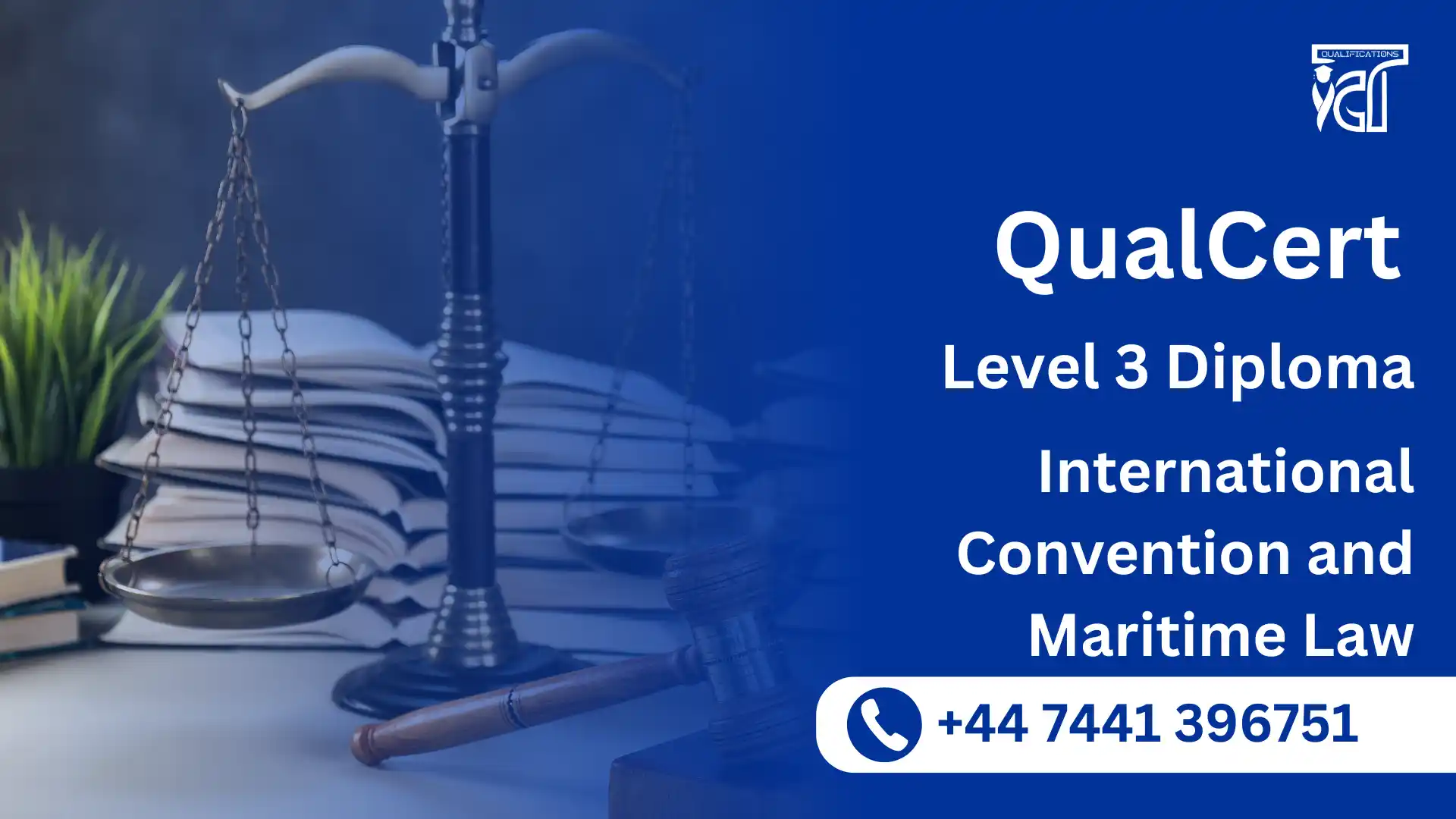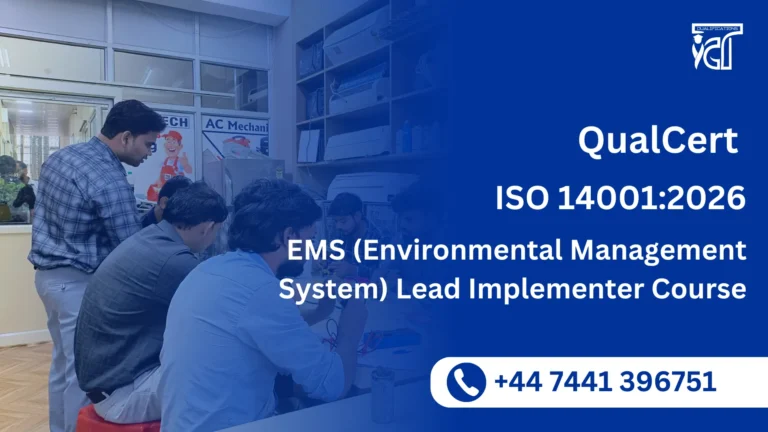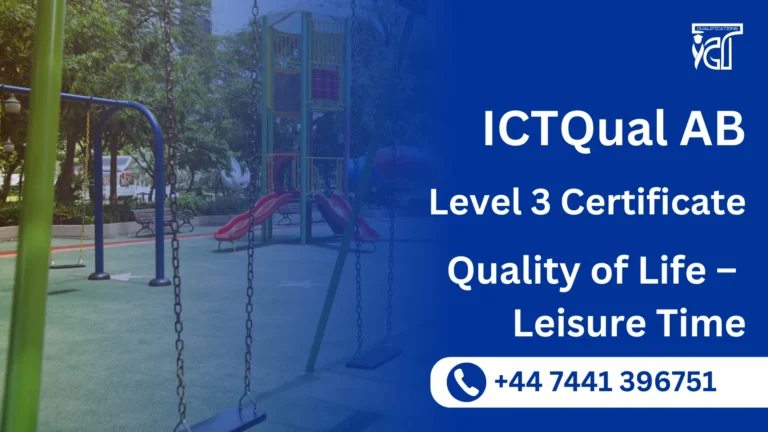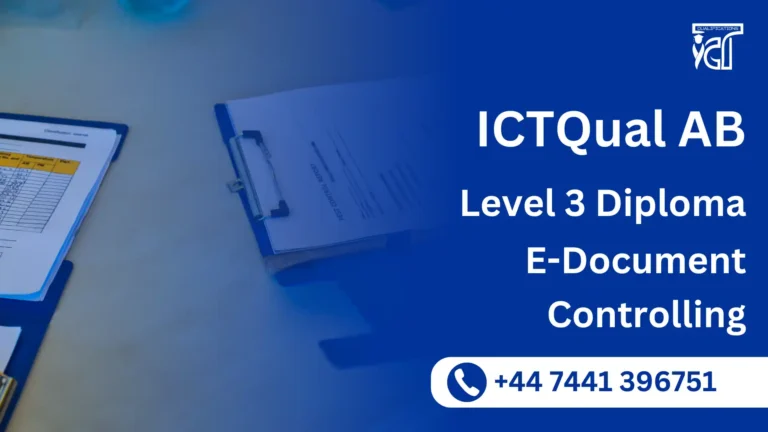The QualCert Level 3 Diploma in International Convention and Maritime Law is a specialist qualification designed to equip learners with a strong foundational understanding of global maritime legal frameworks, international conventions, and regulatory standards that govern the operation of shipping, port management, and maritime trade.
With the shipping industry handling over 80% of global trade by volume, knowledge of international maritime law is essential for professionals working within the marine, logistics, insurance, and legal sectors. This Level 3 diploma provides a comprehensive introduction to the rules and legal structures that underpin international shipping operations, vessel compliance, maritime safety, environmental protection, and dispute resolution at sea.
Learners will explore critical international conventions such as:
- The International Maritime Organization (IMO) regulatory framework
- The International Convention for the Safety of Life at Sea (SOLAS)
- The International Convention for the Prevention of Pollution from Ships (MARPOL)
- The United Nations Convention on the Law of the Sea (UNCLOS)
- Maritime labour laws and flag state responsibilities
This diploma provides an ideal balance between legal theory and its application in real-world maritime contexts. It is designed for individuals who aspire to work in maritime law, marine logistics, shipping operations, vessel registration and compliance, marine insurance, or policy advisory roles in international trade and transport.
Whether you are entering the maritime sector for the first time or expanding your current knowledge for professional development, the QualCert Level 3 Diploma in International Convention and Maritime Law will provide the legal literacy, compliance awareness, and critical thinking skills needed to operate within a globally regulated industry.
QualCert Level 3 Diploma in International Convention and Maritime Law
The QualCert Level 3 Diploma in International Convention and Maritime Law, offers 60 Credits, requiring a Total Qualification Time (TQT) of 300 hours, including 210 Guided Learning Hours (GLH).
| Unit Ref# | Unit Title | Credit | GLH | TQT |
| QC06103-1 | Advanced Legal Analysis of UNCLOS and Jurisdictional Authority | 10 | 35 | 50 |
| QC06103-2 | Case Law in Maritime Accidents, Insurance, and Arbitration | 10 | 35 | 50 |
| QC06103-3 | Legal Approaches to Maritime Security, Piracy, and Armed Robbery | 10 | 35 | 50 |
| QC06103-4 | International Port State Control Regimes and Legal Inspections | 10 | 35 | 50 |
| QC06103-5 | Basic Supply Chain Principles | 10 | 35 | 50 |
| QC06103-6 | Maritime Risk Management and Legal Advisory Practices | 10 | 35 | 50 |
GLH (Guided Learning Hours) and TQT (Total Qualification Time) are terms commonly used in vocational qualifications to help define the amount of time a learner is expected to spend on their studies.
1. GLH (Guided Learning Hours)
GLH refers to the number of hours a learner spends being directly taught, supervised, or supported during their course. This includes the time spent in activities such as:
- Classroom instruction
- Practical workshops
- One-on-one tutoring or mentoring sessions
- Online learning sessions with tutor support
In other words, GLH represents the time that learners are actively engaged with their instructors or learning activities.
2. TQT (Total Qualification Time)
TQT represents the total amount of time a learner is expected to invest in completing a qualification, including:
- GLH (Guided Learning Hours): Time spent on direct learning, as explained above.
- Self-Directed Learning: This includes time spent on independent study, research, assignment completion, preparation for exams, and any other work the learner does outside of direct teaching hours.
TQT is a broader measure that includes all the time required to achieve the qualification. It helps learners and employers understand the overall commitment required for the qualification.
Key Differences Between GLH and TQT:
- GLH focuses on direct learning with guidance or supervision.
- TQT includes GLH as well as independent study time and other learning-related activities.
Example:
If a qualification has a TQT of 600 hours and a GLH of 250 hours, it means the learner should spend 250 hours in direct learning (classroom, online, or tutor-led sessions) and 350 hours on independent study or research.
Learning Outcomes of QualCert Level 3 Diploma in International Convention and Maritime Law:
Unit 1: Advanced Legal Analysis of UNCLOS and Jurisdictional Authority
Learning Outcomes:
- Demonstrate a detailed understanding of the United Nations Convention on the Law of the Sea (UNCLOS) and its legal framework.
- Analyze jurisdictional authority in maritime zones, including territorial seas, exclusive economic zones (EEZ), and continental shelves.
- Evaluate state rights and responsibilities under UNCLOS related to navigation, resource exploitation, and environmental protection.
- Apply advanced legal reasoning to jurisdictional disputes and maritime boundary issues.
Unit 2: Case Law in Maritime Accidents, Insurance, and Arbitration
Learning Outcomes:
- Examine key case law related to maritime accidents, liability, and insurance claims.
- Interpret judicial decisions and arbitration outcomes affecting maritime dispute resolution.
- Assess the legal principles underpinning maritime insurance contracts and claims settlements.
- Apply case law precedents to real-world maritime legal scenarios and arbitration processes.
Unit 3: Legal Approaches to Maritime Security, Piracy, and Armed Robbery
Learning Outcomes:
- Understand international legal frameworks addressing maritime security threats, including piracy and armed robbery at sea.
- Analyze relevant conventions, protocols, and enforcement mechanisms designed to combat maritime crime.
- Evaluate the roles and responsibilities of flag states, coastal states, and international organizations in maritime security.
- Develop legal strategies for prevention, response, and prosecution of maritime security incidents.
Unit 4: International Port State Control Regimes and Legal Inspections
Learning Outcomes:
- Describe the structure and objectives of international Port State Control (PSC) regimes.
- Understand legal requirements and inspection procedures under PSC frameworks.
- Analyze the role of PSC in enforcing international maritime conventions and safety standards.
- Assess the impact of PSC inspections on ship compliance, safety management, and operational risk.
Unit 5: Drafting and Reviewing Maritime Contracts, Charter Parties, and Commercial Terms
Learning Outcomes:
- Demonstrate proficiency in drafting and reviewing key maritime contracts, including charter parties and commercial agreements.
- Identify essential legal clauses and commercial terms used in shipping contracts.
- Evaluate contractual risks, obligations, and dispute resolution provisions.
- Apply best practices in contract negotiation and documentation to safeguard stakeholder interests.
Unit 6: Maritime Risk Management and Legal Advisory Practices
Learning Outcomes:
- Understand principles of maritime risk assessment and management in legal contexts.
- Analyze the role of legal advisors in supporting risk mitigation strategies for shipping operations.
- Evaluate insurance, liability, and compliance risks faced by maritime stakeholders.
- Develop practical skills for providing legal advice on maritime risk management and regulatory compliance.
Course Benefits: QualCert Level 3 Diploma in International Convention and Maritime Law:
The QualCert Level 3 Diploma in International Convention and Maritime Law delivers a wide array of professional, academic, and practical benefits for individuals who are currently in—or aspiring to enter—the global shipping, maritime, or legal industries. As international maritime activities become increasingly regulated and interconnected, professionals with knowledge of international conventions and maritime law are in high demand across sectors like logistics, insurance, port operations, legal services, and marine policy advisory.
Here’s a detailed overview of the key benefits of this valuable qualification:
1. Gain In-Demand Legal Knowledge in a Global Industry
This diploma provides learners with a structured understanding of the core legal instruments that govern the international maritime industry. From SOLAS and MARPOL to UNCLOS and the MLC, you’ll learn the significance of each legal framework and how they apply to global shipping operations, vessel registration, environmental compliance, and safety management.
2. Strengthen Your Career Prospects in Maritime and Shipping Sectors
The course gives you a strong legal and regulatory foundation that enhances your appeal to employers in a wide range of fields, including:
- Shipping and freight companies
- Maritime law firms
- Port and harbour authorities
- Flag state administrations
- Marine insurance and risk consultancies
- International trade and export companies
- Marine survey and compliance auditing services
A Level 3 qualification also demonstrates your readiness for entry-level or supervisory roles involving legal compliance and operational oversight.
3. Enhance Your Understanding of International Legal Frameworks
You will learn how international maritime law is formed, enforced, and interpreted. This includes understanding:
- The function of international organizations like the IMO
- The structure of flag state vs. port state responsibilities
- Dispute resolution in maritime contexts
- Shipowner liabilities and seafarer rights
- Legal aspects of marine pollution and environmental obligations
Such knowledge is crucial for anyone working with contracts, safety regulations, marine claims, or vessel documentation.
4. Boost Compliance and Risk Management Skills
Whether you’re an operator, port manager, or involved in maritime administration, compliance with international conventions is non-negotiable. This diploma helps you:
- Identify risks related to legal non-compliance
- Understand audit and inspection requirements
- Support maritime safety management systems (SMS)
- Contribute to the implementation of policies that reduce legal exposure and improve corporate governance
5. Pathway to Higher Education and Professional Certifications
The Level 3 Diploma acts as a stepping stone to advanced study and professional qualifications, such as:
- Level 4 or 5 Diplomas in Maritime Law or Shipping Management
- Degree programs in Maritime Studies, International Law, or Marine Policy
- Certifications offered by the Chartered Institute of Logistics and Transport (CILT) or Lloyd’s Maritime Academy
This course builds the academic readiness and subject vocabulary needed to succeed at the next level.
6. Ideal for a Range of Maritime Professionals
The course benefits not just legal professionals, but also:
- Marine officers and seafarers transitioning to shore-based roles
- Ship managers and vessel operators needing legal knowledge
- Port administrators dealing with vessel clearance and documentation
- Maritime security or safety inspectors
- Traders and exporters navigating marine legal frameworks
7. Improve Global Employability in a Regulated Industry
Maritime law is international in nature. By gaining knowledge of global conventions and regulations, you significantly improve your employability not just locally but across shipping hubs in the UK, Europe, the Middle East, Asia, and beyond. You’ll gain a competitive edge in job markets that require legal awareness across international borders.
8. Flexible Learning Options for Working Professionals
The QualCert Level 3 Diploma is often delivered online or in blended learning formats, making it suitable for professionals balancing work commitments. This flexibility allows learners to:
- Study at their own pace
- Apply legal principles in their current roles as they learn
- Access global learning from any location with internet access
9. Boost Analytical and Critical Thinking Skills
As part of the course, you’ll develop the ability to read and interpret legal texts, analyse case studies, and apply legal reasoning to real-world maritime issues. These are key skills for professionals involved in compliance, governance, investigations, and operational decision-making.
The QualCert Level 3 Diploma in International Convention and Maritime Law is more than a qualification—it is a career-building tool. It equips learners with the legal insight, compliance awareness, and international perspective needed to thrive in one of the world’s most critical and regulated industries. Whether you’re just starting out or upskilling for a specialised role, this course provides the practical and professional edge to succeed in global maritime operations.
The QualCert Level 3 Diploma in International Convention and Maritime Law is a specialised qualification developed for learners who are either entering or already working in the maritime, legal, or shipping industries and want to gain a deeper understanding of international maritime law and its global applications.
This diploma is ideal for individuals seeking to build professional knowledge of critical maritime conventions, legal obligations, regulatory compliance, and marine governance. Whether your goal is to enhance career prospects, transition into a maritime-focused legal role, or improve operational awareness within international shipping, this course serves as a valuable stepping stone.
Aspiring Maritime Professionals
This course is well-suited for students and early-career individuals who wish to pursue careers in maritime administration, international shipping, or marine operations. It serves as a foundational legal qualification that introduces them to essential conventions and regulatory systems that shape the modern maritime industry.
Relevant goals for this group may include:
- Gaining legal knowledge to prepare for advanced maritime study
- Entering the shipping, port, or customs sectors
- Pursuing roles in international trade or marine logistics
Professionals Working in Shipping, Ports, or Logistics
This diploma is ideal for operational staff, supervisors, or coordinators in shipping companies, port authorities, freight forwarders, or vessel support services who want to expand their understanding of international maritime law.
These learners may already be involved in:
- Cargo management or marine logistics
- Ship operations or chartering
- Port clearance, inspections, or maritime safety
- Compliance, documentation, or legal liaison roles
By gaining legal literacy, these professionals can improve decision-making, reduce regulatory risks, and add value to their organisations.
Maritime Law Enthusiasts or Legal Assistants
Individuals working as paralegals, legal assistants, or administrative staff within law firms or legal departments focusing on shipping, trade, or transport law will benefit greatly from this course. It provides the context, terminology, and global framework essential for supporting more senior legal professionals or pursuing further legal education.
Marine Officers and Seafarers Transitioning to Shore-Based Roles
Those with experience at sea—such as deck officers, engineers, or captains—often look to transition into shore-based careers in fleet management, marine insurance, regulatory bodies, or consultancy. This course provides a clear understanding of the legal framework that governs their industry and supports that transition.
Career Changers and Mature Learners
Adults looking to change careers and enter the maritime or legal sector will find this diploma accessible, practical, and career-focused. With flexible learning options and content delivered in straightforward language, it caters to learners who may not have a legal background but want to establish new qualifications relevant to international shipping and regulation.
International Trade and Compliance Professionals
Professionals involved in customs, freight forwarding, marine insurance, or international trade compliance benefit from this diploma by strengthening their understanding of maritime law, especially how it intersects with:
- Marine environmental regulations
- Cargo liability
- International shipping conventions
- Port state and flag state obligations
Key Traits of the Ideal Learner
- Has an interest in maritime law, international trade, or marine operations
- May have some industry exposure (though not required)
- Possesses analytical thinking and attention to detail
- Is keen to understand legal compliance and global shipping regulations
- May be preparing for further legal, academic, or regulatory qualifications
- Is motivated to grow within the global maritime, shipping, or legal services sectors
Summary
The ideal learner for the QualCert Level 3 Diploma in International Convention and Maritime Law is someone who is proactive, curious about international regulation, and aiming to enhance their role in the maritime or legal sectors. Whether you are just starting out or building on your current role, this diploma gives you the foundational legal expertise to contribute meaningfully in global maritime environments.
Entry Requirements
Register Now
Qualification Process
Qualification Process for the QualCert Level 3 Diploma in International Convention and Maritime Law
- Self-Assessment:
Begin by evaluating your eligibility to ensure you meet the qualification requirements, including work experience, knowledge, and language proficiency. - Registration:
Complete your registration by submitting the required documents, including a scanned copy of a valid ID, and paying the registration fee. - Induction:
An assessor will conduct an induction to confirm your eligibility for the course and explain the evidence requirements. If you do not meet the criteria, your registration will be cancelled, and the fee will be refunded. - Assignments & Evidence Submission:
Provide all assignments and the necessary evidence based on the assessment criteria outlined in the course. If you are unsure of the required evidence, consult with the assessor for guidance on the type and nature of evidence needed. - Feedback and Revision:
The assessor will review your submitted evidence and provide feedback. Evidence that meets the criteria will be marked as “Criteria Met,” while any gaps will be identified. You will be asked to revise and resubmit if needed. - Competence Evidence:
Submit final evidence demonstrating that all learning outcomes have been met. This evidence will be marked as “Criteria Met” by the assessor once it is satisfactory. - Internal Quality Assurance (IQA):
The Internal Quality Assurance Verifier (IQA) will review your evidence to ensure consistency, quality, and compliance with standards. - External Verification:
The IQA will submit your portfolio to QualCert External Quality Assurance Verifier (EQA) for final confirmation. The EQA may contact you directly to verify the authenticity of your evidence. - Certification:
Upon successful completion of all checks, QualCert will issue your official certificate, confirming that you have attained the QualCert Level 3 Diploma in International Convention and Maritime Law.







